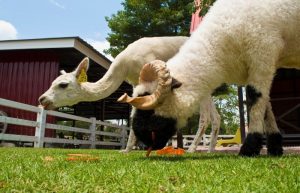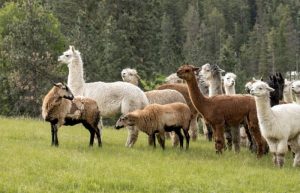
Can Sheep and Alpacas Live Together?
Alpacas and sheep have many similarities; both are often raised for their thick and valuable wool coats. As small livestock animals, both alpacas and sheep can be considered a wise investment that saves on space and resources. Both animals are also ruminants, meaning they “chew the cud.” Because of all their similarities, you may be wondering whether or not you can keep sheep and alpacas together.
Can alpacas be kept with sheep? Sheep and alpacas can be kept together and can thrive in a group. Alpacas are even known to protect sheep from predators and other danger. One thing to keep in mind when raising alpacas and sheep together is that there are certain dietary restrictions that can apply to each group. You should check any grain, supplements, and minerals you feed to ensure that it won’t be a health risk to one of the animals.
Before you decide to intermingle your alpacas and sheep, you should take time to research and prepare. This can make for a smooth transition as the animals learn to live together. In this article, I’ll cover everything you should consider when it comes to keeping your sheep and alpacas together.
Keeping Sheep and Alpacas Together: What You Need to Know
When it comes to deciding if two species of animals will be able to live together in unison, you should look at the characteristics of each species and how similar or different they are. Even if the animals are very similar, nothing is a given with animals due to natural instincts and a mind of their own. Here are some things to know when it comes to raising alpacas and sheep together:
Both Alpacas and Sheep are Herd Animals
Since both alpacas and sheep are considered prey animals, they naturally prefer to live in a group with other animals. When in a group, there are more eyes, ears, and noses that can sense danger approaching. Because of this characteristic, both alpacas and sheep can easily integrate into a group.
If you want to give your animals a better sense of security and protection, keeping them with another similar species can be the way to go. Predators are less likely to attack a group of animals that stick close together. They’ll often go after stragglers who have separated themselves from the group. This is why you see both sheep and alpacas stay so close together even as they graze and rest.
Try and Have at Least Three of Each Animal in a Group
While sheep and alpacas can live together in unity, both animals much prefer their own species. This is because both of these animals imprint on their mothers at birth. Imprinting is when an animal develops a deep trust in its nurturer within the first few days of its life. This trust will last for a lifetime. If raised by its mother from birth, a lamb or cria (baby alpaca) will imprint on its mother. If the animal has to be hand-raised by a human, they will often imprint on humans.
That being said, when a baby animal imprints on its mother, it also imprints on its own species. It learns to trust any animal that looks similar to its mother. This forms a deeper bond between animals of the same species compared animals of different species.
For this reason, you can provide your animals with more security and comfort by having a few animals of the same species. It’s recommended to have at least three animals of the same species to provide a community setting. From there, you can integrate your alpaca flock with your sheep flock to offer the protection that a larger group provides.
Alpacas Can Act as Livestock Guardian Animals
 Alpacas have a lot in common with their larger cousins, the llamas…particularly, they both have a knack for spitting and warding off predator nuisances. Although they are small, alpacas are known to have some fight in them when it comes to dealing with predators or annoying dogs. For this reason, they make great guardian animals for sheep.
Alpacas have a lot in common with their larger cousins, the llamas…particularly, they both have a knack for spitting and warding off predator nuisances. Although they are small, alpacas are known to have some fight in them when it comes to dealing with predators or annoying dogs. For this reason, they make great guardian animals for sheep.
When faced with predators, sheep will flee and lose any sense of thinking rationally while alpacas will stand their ground, spit, bite, kick, and even chase any animal that may threaten them. They can provide an extra level of protection for your flock of sheep by keeping the two species together. One important thing to note is while alpacas will show aggression towards predators, they are smaller animals and more susceptible to larger predatory animals, like large dogs, mountain lions, and bears.
To know more about livestock guardian animals, check out my article What Are the Best Livestock Guardian Animals?
Alpacas Can Jump Over Sheep Fencing
When it comes to keeping two different species of animals together, you’ll need to ensure that living arrangements meet the needs of both animals. For example; sheep can often be kept in areas of lower fencing since they don’t usually try to jump over the fencing. Alpacas on the other hand, can easily jump over fencing that could contain sheep.
So, if you plan to keep the two animals together, you’ll want to make sure the fence is at least 5 feet high so that the alpacas can not jump out. You should also consider using woven wire fencing instead of four-board fencing or electric fencing since neither the sheep nor the alpacas will be able to crawl through woven wire.
Alpacas and Sheep Require Similar Routine Maintenance
One reason it can be easy to raise sheep and alpacas together is that they require much of the same routine maintenance. Wool sheep and alpacas will need to be sheared once a year to remove their fleece and to maintain proper hygiene. Both animals also require hoof trimming, where their hooves are clipped to provide a more balanced surface. You’ll also need to vaccinate and deworm your small livestock on a regular basis.
Sheep can be more susceptible to internal parasites since they tend to not mind eating near their feces and waste. Alpacas on the other hand, can be more picky and will avoid eating near waste. Nonetheless, if you plan on keeping the two animals together, you should deworm every 1 – 3 months to prevent parasites.
Feed Your Alpacas and Your Sheep Separately
If you are planning to keep alpacas and sheep together, consider feeding the members of each species separately. There are a few reasons for this. Firstly, by doing this you can avoid the animals from picking on each other. Alpacas can be aggressive when agitated, which can lead to them kicking or biting at the sheep, so separating them when it comes time to eat will keep this from happening.
Another reason for doing this is to ensure that each species is getting their necessary dietary requirements. Both animals may require certain supplements, grains, and minerals to help sustain their diet besides the forage they get from grazing. Both alpacas and sheep can an intolerance to copper, so you’ll want to avoid any supplements or minerals that are high in copper.
Keep Male Alpacas Separate From Sheep
Although both alpacas and sheep are small livestock, sheep are still considerably smaller than alpacas. They also tend to be more passive. Unfortunately, this can often lead to them being taken advantage of by male alpacas, even wethers or neutered male alpacas. This can lead to the injury of your sheep.
For this reason, it’s best to keep your male alpacas separate from sheep. If you plan on breeding alpacas, you’ll want to move your sheep to a separate pasture so that they won’t be picked on by the males.
Wether sheep on the other hand, can live in with both ewe sheep and alpacas and won’t cause much trouble. To learn more about wether sheep, check out my article Wether Sheep: Definition of Wether Sheep & Unique Traits.
Diseases Can Be Passed Between Sheep and Alpacas
One thing to be aware of when it comes to raising alpacas and sheep together is that certain diseases can be transmitted between the species. Talk to your vet to ensure both animals get all the proper vaccines they need, and discuss steps you can take to avoid diseases that don’t have a vaccine.
If you do notice one animal in your flock displaying signs of sickness, you should isolate them immediately until you are able to determine what the sickness may be. Isolation can be hard for herd animals like alpacas and sheep, so keep them in a place where they can at least see the other animals.
When it comes to farming, keeping two species of animals together can help pasture utilization as well as save space and resources. If you’d like to know about other livestock animals that can co-exist, check out the articles below!
